Honoring our educators
Six members from the College of Engineering were recognized at CMU’s annual Celebration of Education Awards.
The annual Celebration of Education Awards recognize outstanding Carnegie Mellon University faculty, educators, and graduate students and their contributions that exemplify the university’s commitment to excellence in education. Extending beyond teaching in the classroom, these awards honor those who incorporate innovative teaching and mentoring methods in their roles and strive for greatness for their students.
The College of Engineering is proud to have the following six winners.
Kurt Larsen
Outstanding Contributions to Academic Advising and Mentoring
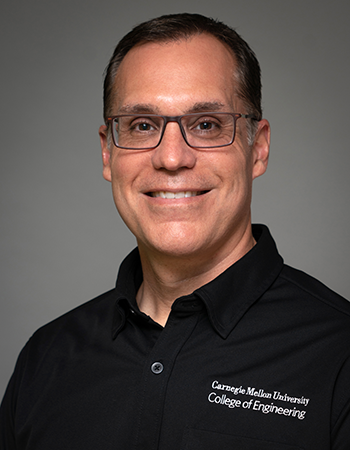
Kurt Larsen is the recipient of the 2024 Carnegie Mellon University Award for Outstanding Contributions to Academic Advising and Mentoring.
Larsen, assistant dean of undergraduate studies, advises as many as 200 first-year students, coordinates the First-Year Orientation and Honors Research programs, organizes the CIT Day and Real-World Engineering events, serves as a valued member of numerous university and college committees, and has been the longtime advisor to the Engineering Student Council and the CMU Solar Racing student groups.
He has helped countless students navigate the transition to college, manage the rigors of our demanding engineering curriculum, and overcome the unexpected challenges they sometimes encounter during their first year.
Senior Vice Provost Amy Burkert may have captured it best when she said, “Kurt is their guide, cheerleader, confidante, and coach but is not afraid to give them tough love and hold them to the same high standards he sets for himself.”
Larsen can be found in his office and on campus with his beloved chocolate Labrador retriever, Mudge, a certified therapy dog who, like Larsen, loves to bring a welcome dose of stress relief and fun to Carnegie Mellon students.
Shawn Blanton
Graduate Student and Junior Faculty Mentoring
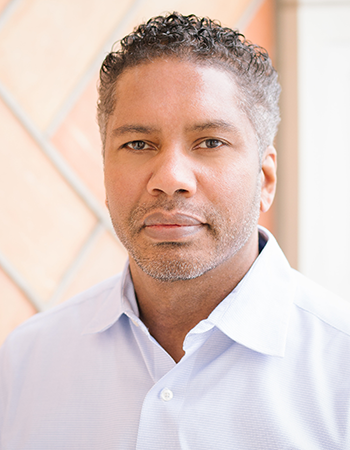
Shawn Blanton, professor of electrical and computer engineering, is the recipient of the Graduate Student and Junior Faculty Mentoring Award. He has been an outstanding pillar of support for numerous students, encouraging them to pursue opportunities and providing invaluable guidance in the right direction.
Blanton is also committed to enhancing the representation of underrepresented minority (URM) groups in science and engineering. Every year for more than two decades, he has visited the annual National Society of Black Engineers (NSBE) convention, as well as his alma mater, Calvin University, to encourage prospective graduate students to consider CMU. He has also recruited students from other URM-centric events, such as the Society of Hispanic Professional Engineers (SHPE), the Tapia workshop for URM and low-income students, and the American Indian Science and Engineering Society (AISES).
“I have watched the university go from having a dismal number of members of color in engineering to becoming a nationally recognized college for having diverse members, and we have Shawn’s leadership to thank for that,” said Sossena Wood, assistant professor in the Department of Biomedical Engineering.
During the pandemic, Blanton supported ECE students by organizing online social events to help them de-stress and build a sense of community. He also provided mentorship to The Neighborhood Academy (TNA), a middle and high school for underserved students not far from CMU, helping families ensure that they received their stimulus checks.
“Shawn could easily have paid much more attention to his own research and teaching and avoided all of the extra time he spent on mentoring others. But that is not in Shawn’s DNA,” said James Garrett, Jr., provost and chief academic officer of CMU. “He is compelled to help other students and faculty of color to be recruited, welcomed, and supported at Carnegie Mellon. He goes well above the call of duty because he truly cares about helping the next generations succeed at Carnegie Mellon.”
Reeja Jayan
Teaching Innovation
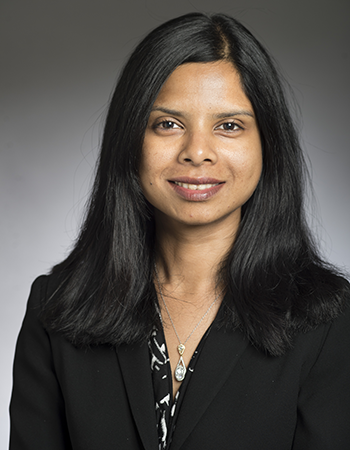
Reeja Jayan, associate professor of mechanical engineering, received the Teaching Innovation Award in recognition of her work in Materials and Their Processing for Mechanical Engineers, an upper-level course that uses Minecraft to demonstrate key concepts like polymer deposition and molecular structure.
With her work being at the intersection of electromagnetics and materials science, focusing on the development of low-cost and long-lasting batteries, it’s no surprise that Jayan’s knack for innovation extends to the classroom, where she’s reimagined how students learn foundational engineering skills.
“I think this is the very first time such a class existed in higher education—it’s definitely the first engineering course of its kind,” said Jayan.
Jayan kick-started this project in 2016 with the help of student interns Miguel Brandao and Takumi Natsume, from the College of Engineering and the College of Fine Arts, respectively. Natsume, a senior in the School of Art, says that taking Jayan’s course was still a valuable learning experience even though he doesn’t study engineering.
“At times, it is hard for an artist to be aware that the skills they have are gifts, especially in an academic environment where everybody is coding away,” said Natsume. “However, Professor Jayan isn’t hesitant about accepting and valuing ideas or people outside of her field.”
Jerry Wang
Teaching Innovation
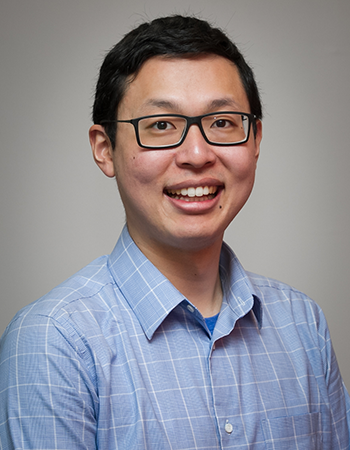
Jerry Wang, assistant professor of civil and environmental engineering, has spent his career lifting others up; it is fitting then that he has been awarded this year’s Teaching Innovation Award for creating his end-of-semester “Participation Shoutouts!” activity. In the exercise, students are encouraged to submit short statements of gratitude for other students in the class who have helped them or who have had a positive effect on them or their studies.
Wang has been creating shoutouts to inspire and uplift others around him for years, going back to his time as a student at MIT. He has become known by his students for his humor and playfulness, which are combined with his emphasis on making sure students really learn class material.
Former students remember Wang and his enthusiasm fondly. Emerson Collins, a graduate of the class of 2023, wrote, “Although I interacted with many amazing professors at CMU, none were quite as genuinely engaged as Jerry. From interactive games (ex. shooting nerf guns at walls to understand statistical distributions) to cooperative team projects, there was never a dull moment in Jerry’s classroom.”
Students credit the “Participation Shoutouts!” for helping them in their studies at CMU. “I have found this practice to increase both my long-term absorption of the material and my overall happiness. By writing down what people did that helped me, I can remember for longer the actual material of the course,” said Alex Wang, a current student.
Vincent Cheng, another current student, said, “Writing participation shoutouts helped remind me of the camaraderie and the importance of teamwork in the context of large projects or grasping complicated concepts, a situation all too common in engineering and in Carnegie Mellon as a whole.”
Wang’s aim with “Participation Shoutouts!” is to reduce friction to expressing gratitude. “There is little I believe more firmly than this—our campus (not to mention our country and our body politic) would be so much the better if more people regularly engaged in the conscientious expression of gratitude.”
Isabel Murdock and Mansi Sood
Graduate Student Service
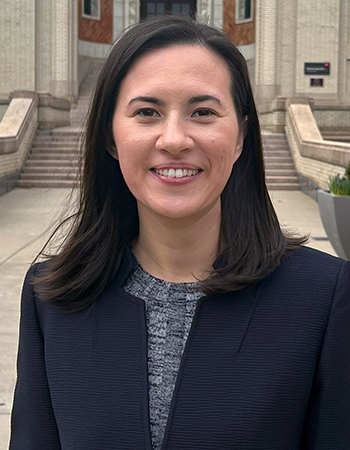
Isabel Murdock
Isabel Murdock and Mansi Sood, doctoral students in the department of electrical and computer engineering, received the Graduate Student Service Award for their contributions in uplifting their peers and creating an inclusive learning environment for all.
One of their recent efforts was the first-ever Pittsburgh Women in Mathematics and Computing Symposium (WMCS), hosted in February 2023. The conference brought together 54 attendees and 15 faculty speakers from various scientific disciplines across multiple universities throughout Pittsburgh. “It was truly empowering to speak with them and learn about their personal experiences—hardships, failures, successes, and much more,” one attendee wrote. “I would love to attend such events again in the future.”
Murdock is a fourth-year Ph.D. student in ECE, researching intervention strategies for mitigating the spread of misinformation on social media. She has mentored undergraduate students as an ECE peer advisor and provided department tours as an ECE Student Ambassador Tour Guide. She has volunteered at multiple ECE Ph.D. open houses, providing campus tours in 2022 and organizing a scavenger hunt in 2023. Murdock has also assisted ECE outreach with SPARK Saturdays, weekend lab events that expose high school students to the field of ECE.
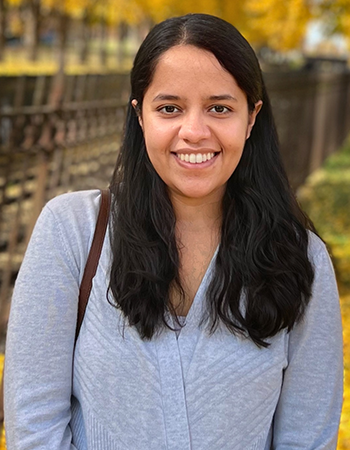
Mansi Sood
Sood is a final-year Ph.D. student in the Department of Electrical and Computer Engineering (ECE), researching ways to make sociotechnical systems more trustworthy and efficacious. She has served on the ECE Diversity, Inclusion, and Outreach (DIO) committee, launching the ECE peer-mentoring program and organizing social events to foster a sense of community in the department. Sood has also served as an event coordinator for the ECE Graduate Organization (EGO), hosting painting fundraisers to support local nonprofit organizations.
“They have demonstrated a commitment to service and diversity, inclusion, and outreach efforts throughout their time at Carnegie Mellon University,” said Giulia Fanti, assistant professor in ECE who mentored Sood and Murdock as they organized the Pittsburgh WMCS.
“Together, they embody the best of our institutional values,” said Osman Yağan, a research professor in ECE who has served as a faculty advisor to both Sood and Murdock. “Their countless initiatives for supporting their peers and the broader community, amid pursuing deep and impactful research, is a testament to their extraordinary character, sincerity, strong ethics, and commitment to empowering those around them.”
